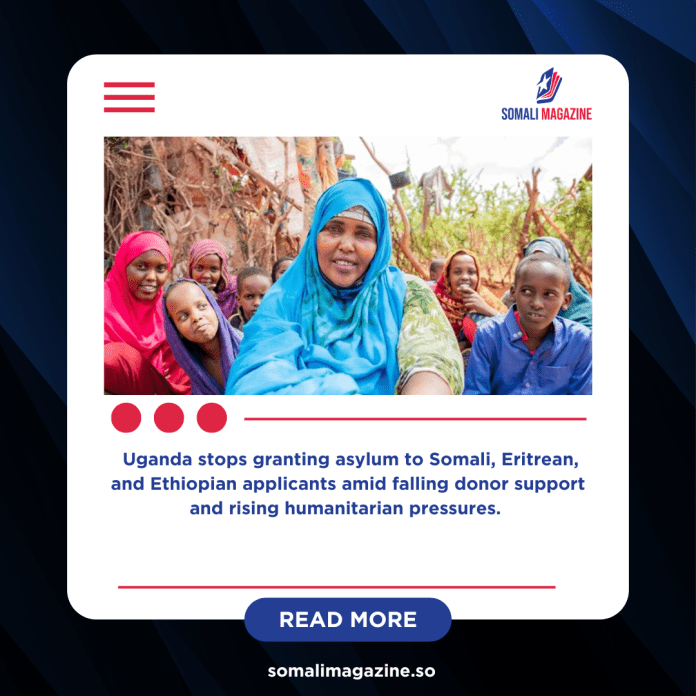Facebook Twitter (X) Instagram Somali Magazine - People's Magazine
Uganda has announced that it will no longer grant refugee status to new asylum seekers from Somalia, Eritrea, and Ethiopia, saying these countries are no longer experiencing active armed conflict. The decision comes as Uganda faces a sharp decline in international funding for its refugee programs, despite continuing to receive large numbers of people fleeing violence in the Democratic Republic of Congo, South Sudan, and Sudan.
Hilary Onek, Uganda’s Minister for Relief, Disaster Preparedness and Refugees, said he has instructed officials to stop processing asylum claims from citizens of Somalia, Eritrea, and Ethiopia. He stressed that those who already hold refugee status will not be affected. According to Onek, Uganda must now prioritize people escaping ongoing war zones because the country can no longer sustain its long-standing open-door policy without adequate financial support.
Uganda hosts nearly two million refugees, making it the largest refugee-hosting nation in Africa and the third largest in the world. For years, it earned global praise for its progressive approach, which allows refugees to work, move freely, and access national services like education and healthcare. This system was built under frameworks like the Self-Reliance Strategy and the Comprehensive Refugee Response Framework, which rely heavily on donor funding to function properly.
However, that financial support has dropped dramatically. Funding fell from $240 million last year to under $100 million this year, with only $18 million received in 2025 so far. Ugandan officials say this has placed enormous pressure on services such as food assistance, schooling, medical care, and shelter. The government estimates it spends more than 2 billion shillings each year supporting refugees, and without international backing, the strain is becoming overwhelming.
UNHCR has also warned that essential services may be reduced even further, especially those meant to protect vulnerable groups like children, survivors of gender-based violence, and unaccompanied minors. With donor support declining and refugee numbers continuing to rise, Uganda says it has been left with no choice but to limit new entries to those coming from active conflict zones.
Although Somalis make up a relatively small share of Uganda’s refugee population—around 51,800 people, or roughly 3.3 percent—they have a long history in the country. Many have lived in Uganda for years, particularly in Kampala’s Kisenyi neighborhood and in Nakivale settlement. Their arrivals came in various waves, beginning with the collapse of the Somali government in 1991, followed by the Islamic Courts Union conflict in 2006 and the severe drought of 2011–2012.
Uganda and Somalia have also maintained close political and military ties. For nearly two decades, Ugandan soldiers have been part of African Union peacekeeping missions fighting al-Shabaab. This cooperation, combined with Uganda’s traditionally flexible asylum policies, made the country an attractive destination for some Somali asylum seekers who sought stability, documentation, and better economic opportunities.
Despite the new restrictions, Uganda says it is working with governments in conflict-affected regions to encourage political solutions that would allow refugees to return home safely and voluntarily. Onek emphasized that the current situation is becoming unsustainable, noting that local Ugandans are increasingly carrying burdens that international donors once helped shoulder. According to him, without renewed global support, Uganda cannot maintain the same level of generosity it has shown for decades.

